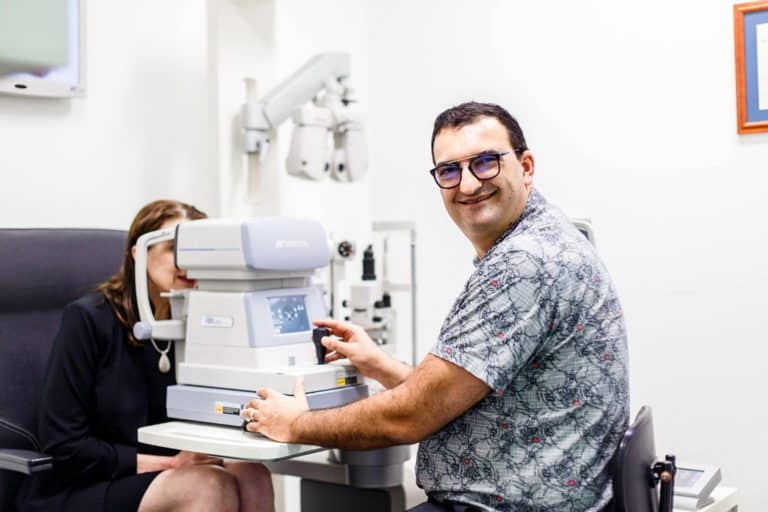When it comes to eye care, many individuals often wonder, “Is obtaining a referral essential for consulting a behavioural optometrist?”
You might also have questions such as “What signs suggest I should visit a behavioural optometrist?”, “How can I choose the ideal practitioner to meet my needs?”, and “What experiences should I expect during my appointment?”
Whether you’re encountering vision-related challenges or are keen to enhance your visual performance, understanding how to access behavioural optometry services is crucial. Let’s explore this topic in detail and resolve any questions you may have.

Understanding Referrals and Accessing Behavioural Optometry
To address the primary concern: In most cases, you DO NOT need a referral to make an appointment with a behavioural optometrist. Behavioural optometrists act as primary eye care providers, enabling you to schedule a visit directly without needing to consult another healthcare professional beforehand. This direct access is particularly beneficial for individuals looking to improve their visual capabilities without the hassle of navigating through multiple referrals.
However, certain situations may warrant a referral for enhanced care:
Integrated care approach: If you are currently receiving treatment for related concerns (such as learning disabilities or neurological conditions), your healthcare provider may refer you to a behavioural optometrist as part of a comprehensive treatment strategy. This collaboration ensures that all aspects of your health are considered, leading to a more effective treatment plan.
Complex cases: For individuals with a complicated medical history or specific eye conditions, a general optometrist or ophthalmologist might recommend a behavioural optometrist for tailored care. Such recommendations can be crucial in ensuring that your unique needs are met, particularly if you have previously encountered challenges in managing your visual health.
While these instances exist, they are not the norm. Most individuals can independently choose to see a behavioural optometrist without needing a formal referral. This accessibility empowers patients to take control of their eye health proactively.
At Eyes by Design, we are pleased to accept both direct appointments and referrals, ensuring that anyone requiring our specialised services can easily access the care they need, fostering a seamless experience for all our patients.
Identifying the Signs That Indicate a Visit to a Behavioural Optometrist
Identifying when to seek the expertise of a behavioural optometrist is crucial. Although referrals are often unnecessary, it’s vital to recognize the signs that indicate you may benefit from behavioural optometry services. Consider scheduling an appointment if you or your child experience:
- Persistent reading difficulties: Struggles with reading speed, comprehension, or frequently losing your place while reading may indicate a need for assistance. These issues can significantly affect academic performance and self-esteem.
- Eye strain or headaches: These symptoms often arise during close-up tasks such as reading or using a computer, suggesting potential underlying issues that may require intervention to prevent further discomfort.
- Poor sports performance: Difficulty judging distances or tracking moving objects could signal the need for a behavioural optometrist’s assistance. Athletes often benefit from enhanced visual skills that support their performance.
- Attention and concentration issues: Trouble maintaining focus on visual tasks or being easily distracted might indicate the need for specialized care, especially in academic settings.
- Coordination problems: Difficulties with hand-eye coordination or general clumsiness can be effectively addressed through behavioural optometry, which can improve overall physical performance.
- Visual discomfort after screen time: Experiencing fatigue, blurred vision, or discomfort after using digital devices is a common concern that can be relieved with appropriate interventions.
- Learning difficulties: If a child struggles academically despite having normal intelligence and putting in effort, it’s worth considering a behavioural optometry assessment to uncover possible visual processing challenges.
- History of head injury or concussion: If visual symptoms persist following head trauma, seeking expert evaluation is essential to ensure proper recovery and care.
- Diagnosed with dyslexia or ADHD: These conditions are often associated with visual processing challenges that a behavioural optometrist can help address, leading to improved learning outcomes.
- Symptoms persist despite normal eye exams: If standard optometry has not resolved your visual concerns, further assessment may be necessary to identify underlying issues.
- Career-specific visual demands: Professions requiring exceptional visual skills, such as pilots, athletes, or surgeons, may necessitate a visit to a behavioural optometrist to ensure optimal performance.
- Developmental concerns: For children who may be lagging in visual-motor skills, early intervention can be highly beneficial to support their growth and learning.
Remember that you do not have to wait for a referral to address these issues. If you identify with any of these signs, feel free to contact a behavioural optometrist, like myself, at Eyes by Design for a comprehensive eye assessment tailored to your individual needs.
Empowering Yourself Through Self-Advocacy in Eye Care
While referrals are typically not required for behavioural optometry, the concept of self-advocacy in eye care is incredibly important. As a patient, you have both the right and responsibility to seek the care that effectively meets your visual needs. Here’s why self-advocacy is crucial:
- Personalised care: You are most familiar with your symptoms and concerns. By proactively seeking specialized care, you ensure that your specific needs are addressed, leading to more effective outcomes.
- Timely intervention: Waiting for a referral can result in unnecessary delays in treatment. Self-advocacy allows for quicker access to essential care, which is particularly important in managing ongoing visual issues.
- Comprehensive approach: Behavioural optometrists offer a holistic perspective on vision care that encompasses much more than a standard eye exam, taking into account how vision impacts daily functioning.
- Empowerment: Taking charge of your eye health decisions leads to greater engagement in your overall healthcare journey, making you an active participant in your well-being.
- Awareness: By researching and selecting a behavioural optometrist, you become more informed about the various options available for visual health, empowering you to make educated decisions.
- Preventive care: It’s crucial not to wait for vision issues to escalate. Proactively visiting a behavioural optometrist can help identify problems early on, allowing for timely intervention.
At Eyes by Design, we encourage our patients to take an active role in their vision health. If you believe that behavioural optometry could be advantageous for you, please don’t hesitate to reach out directly. We are here to support your journey toward optimal visual health and performance.

Essential Criteria for Selecting Your Trusted Behavioural Optometrist
Since a referral is typically not required, the responsibility of selecting the right behavioural optometrist falls on you. Here are several important factors to consider:
- Credentials: Ensure that the optometrist possesses specific training and certification in behavioural optometry, as this expertise is essential for effective treatment.
- Experience: Look for a practitioner with a proven track record of successfully treating your specific concerns, ensuring they have the necessary skills and knowledge.
- Technology: Choose a practice that utilizes the latest technology for assessments and treatments, ensuring the highest standard of care and more accurate results.
- Approach: Seek an optometrist whose treatment philosophy aligns with your personal healthcare beliefs and objectives, fostering a supportive and effective patient-provider relationship.
- Communication style: Select a practitioner who communicates clearly and listens attentively to your concerns, as this enhances the overall experience and care you receive.
- Location and accessibility: Consider the convenience of the practice’s location and the availability of office hours, ensuring that you can easily attend appointments.
- Patient reviews: Read testimonials or ask for references from current patients to assess the quality of care provided, gaining insight into the experiences of others.
- Medicare, Health Insurance, and Costs: Be aware of what services are covered by Medicare and your health insurance, along with any potential out-of-pocket expenses, to avoid surprises.
- Specialisations: Some behavioural optometrists may focus on specific areas such as pediatrics or sports vision, which could be relevant to your needs depending on your lifestyle.
- Collaborative care: If you have other health concerns, choose an optometrist willing to collaborate with your other healthcare providers, ensuring comprehensive care for your overall well-being.
At Eyes by Design, we aim to meet all these criteria by offering expert care, advanced technology, and a patient-centered approach. We encourage prospective patients to ask questions and ensure they feel comfortable before scheduling an appointment, fostering trust and transparency in your care.
Preparing for Your First Appointment with a Behavioural Optometrist
Understanding what to expect during your first visit can help ease any anxieties related to the experience. Here’s a typical process you can anticipate at Eyes by Design:
- Comprehensive history: We’ll discuss your visual concerns, overall health, and lifestyle factors that may influence your vision, providing us with important context for your care.
- Standard eye exam: This includes tests for visual acuity, refraction assessments, and evaluations of overall eye health, allowing us to get a complete picture of your visual status.
- Specialised testing: We’ll assess various aspects of visual function, including eye teaming, tracking, and focusing abilities, which are crucial for effective visual processing.
- Functional vision evaluation: This may involve tests designed to simulate real-world visual tasks, helping us to understand how your vision functions in daily life.
- Visual processing assessment: We’ll evaluate how your brain interprets visual information, which is vital for effective vision and learning capabilities.
- Discussion of findings: We’ll explain our observations and how they relate to your specific symptoms or concerns, ensuring you are fully informed about your visual health.
- Treatment recommendations: Based on our findings, we’ll propose a personalised treatment plan tailored to your needs, addressing any issues identified during the assessment.
- Questions and answers: We welcome your questions and encourage you to share any concerns regarding our findings or recommendations, promoting an open dialogue about your care.
- Next steps: We’ll outline the proposed treatment process and schedule follow-up appointments if necessary, ensuring you know what to expect moving forward.
Remember, this process is not solely about assessing your eye health; it’s also about enhancing your overall visual performance and enriching your quality of life. Come prepared with questions and be ready to actively engage in your care, which can make a significant difference in your treatment experience.
Understanding the Vital Impact of Behavioural Optometry on Holistic Health
Behavioural optometry plays a crucial role in your overall health and well-being in multiple ways:
- Cognitive function: Clear vision is vital for effective learning and information processing, impacting academic and professional success.
- Physical health: Vision problems can lead to poor posture and physical strain, affecting overall health and wellness.
- Mental health: Vision difficulties can result in heightened anxiety and diminished self-esteem, influencing emotional well-being.
- Productivity: Optimal visual function is essential for both work and academic performance, enhancing your ability to succeed.
- Quality of life: Achieving clear, comfortable vision enhances enjoyment of daily activities and social interactions, leading to a more fulfilling life.
- Safety: Good vision and effective visual processing are crucial for safe activities, such as driving and operating machinery.
- Social interaction: Visual cues are essential for non-verbal communication, affecting relationships and social dynamics.
- Preventive care: Early intervention can prevent the progression of vision issues, safeguarding your long-term health and well-being.
By addressing visual function comprehensively, behavioural optometrists significantly contribute to overall health and well-being. This holistic approach underscores the importance of seeking specialised care whenever needed, regardless of whether a referral is involved.
Strategically Accessing Behavioural Optometry Services for Optimal Vision
While a referral is typically not required to see a behavioural optometrist, understanding when and how to access this specialised care is essential. At Eyes by Design, we are committed to providing accessible, comprehensive vision care that goes beyond standard eye exams, ensuring all patients receive the attention they deserve.
Whether you are dealing with specific visual challenges or simply wish to enhance your visual performance, do not let the absence of a referral prevent you from seeking assistance. Take charge of your visual health by directly contacting a qualified behavioural optometrist who can help you achieve optimal results.
Your vision impacts every aspect of your life. By choosing behavioural optometry, you are making an investment in your overall well-being and quality of life, paving the way for a brighter future.
We encourage you to listen to your body, recognize the signs that indicate you may need specialised care, and take proactive steps towards achieving optimal visual health. Your vision is too important to overlook.
If you have any questions or would like to schedule a routine eye exam, please do not hesitate to contact us at Eyes by Design. Your journey to improved vision starts here, and we are excited to support you on this path.
This article aims to enhance understanding and knowledge about general eye health topics.
It should not replace professional advice, diagnosis, or treatment.
Always consult your healthcare professional before incorporating this information into your health regimen.
Dr Nicholas Altuneg
For over two decades, my greatest passion has been helping people of all ages live improved lives through better vision. At Eyes by Design, vision is so much more than simply seeing clearly or reading small letters from a distance; it fundamentally shapes your perceptions and reactions every moment of your day.
Read more about Dr Nick
Do You Need a Referral to See a Behavioural Optometrist? Everything You Need to Know
The Article: Referral to See a Behavioural Optometrist: Key Insights first appeared on https://writebuff.com.





This is a thought-provoking exploration into the world of behavioural optometry and the access routes one can take to find the right care. As someone who has personally navigated the sometimes confusing landscape of eye care, I understand all too well the hesitation that comes with seeking out specialists, especially in fields that feel somewhat niche, like behavioural optometry.
I really appreciate your perspective on the sometimes tangled world of eye care. It’s so true that navigating specialties like behavioural optometry can feel daunting, especially when you’re trying to figure out what’s best for your own needs.
Navigating the world of eye care can feel like wandering through a maze, especially when it comes to something as specific as behavioural optometry. I can relate to your experience of hesitating to seek out specialists—sometimes it just feels daunting when you’re trying to find the right fit for your needs.
Navigating eye care can definitely feel overwhelming, especially when dealing with something as specialized as behavioural optometry. It’s completely understandable to hesitate when searching for the right kind of support; finding a specialist who truly understands your needs is no small task.
I completely understand what you mean about the feeling of wandering through a maze when it comes to eye care. Behavioral optometry can be particularly complicated since it merges aspects of vision with cognitive practices, which isn’t something many people are familiar with.
You’ve hit the nail on the head about the maze-like world of eye care! It’s almost like a choose-your-own-adventure book, but instead of finding treasure, you’re just trying to figure out why your eyes hate reading small print or why your kids can’t seem to hit the right notes on the piano.
It’s interesting how navigating the realm of eye care can often feel like exploring uncharted territory. Your experiences resonate with many who have grappled with understanding the different specialties available, particularly in fields like behavioural optometry, which seem to be less mainstream.
Navigating the realm of eye care can certainly feel overwhelming. Many people become so focused on basic vision correction that they don’t realize the depth of specialties available. Behavioural optometry is one area that often slips beneath the radar. It goes beyond just prescribing glasses or contact lenses; it looks at how visual processes can affect learning and behaviour.
Navigating the world of eye care can definitely feel like stepping into a maze. Each specialty has its own unique focus, and it can be tough to know where to turn, especially with something like behavioural optometry that doesn’t get the same visibility as more common areas.
It’s so true; navigating eye care can feel like a maze, especially with how specialized each area can be. Behavioural optometry is a perfect example of something that’s incredibly important yet often overlooked. I remember when I first learned about it, I was surprised by how much our vision affects overall learning and behavior. It’s fascinating to think about how something as fundamental as eyesight can play such a huge role in educational outcomes or even mental health.
You’re spot on about the maze of eye care and how easily behavioral optometry can slip under the radar. It’s interesting to consider the connection between vision and learning; many people don’t realize how closely our eyesight ties into cognitive functions. For children especially, undiagnosed vision issues can mimic or exacerbate learning difficulties, which can lead to misunderstandings in school settings.
You’ve hit on something really important with behavioral optometry. It’s wild how often we take the complexity of our vision for granted. When we think of eyesight, it usually brings to mind just the basic ability to see clearly—like getting those glasses or contacts to help with our vision. But as you mentioned, the link between vision and learning or behavior is so much deeper.
You raise a great point about how we often overlook the intricacies of our vision. Most people don’t realize that seeing clearly is just one piece of the puzzle. Behavioral optometry really underscores how our visual skills contribute to everything from reading to social interactions.
You’re hitting on something really important here. When it comes to eye care, it’s easy to focus solely on the basics like getting your prescription right or picking out stylish frames. But dive a bit deeper, and you find all these interconnected strands, like behavioral optometry, that often fly under the radar.
You’re hitting on something really important here. Eye care often gets reduced to just framing and prescriptions, but the nuances of vision really deserve more attention. It’s fascinating to think about how our visual habits affect our overall well-being. Behavioral optometry, for example, isn’t just about correcting vision; it’s about understanding how we use our eyes daily and how that impacts our learning and emotional health.
You’re hitting on something really important here. The basics of eye care are crucial, but it’s fascinating to consider how many layers there are to it. Behavioral optometry, for example, opens up a whole new perspective on how our vision not only affects what we see but also how we engage with the world around us. I’ve found that understanding the connection between vision and behavior can be a game-changer for people, especially in terms of learning and development.
It’s interesting how often we take our eyesight for granted, isn’t it? I think many people associate vision issues with just being able to see clearly, but there’s so much more going on beneath the surface. Behavioural optometry really highlights that connection between vision and overall development—educational success, social skills, even emotional health.
You raise a valid point about how we often overlook the complexities of vision. Many people don’t realize that clear sight is just the tip of the iceberg when it comes to eye health. For instance, behavioral optometry really does shed light on how vision goes hand-in-hand with our cognitive and emotional development.
You bring up a fascinating aspect of vision that often goes unnoticed. It’s interesting how our understanding of eye health has evolved beyond just the physical act of seeing. I’ve always found the connection between vision and cognitive processes particularly compelling. It’s amazing how our visual experiences shape not only how we interpret the world but also our emotional responses to it.
It really is fascinating how we often overlook our eyesight until something goes wrong. The connection between vision and overall development is deeper than many people realize. As you pointed out, behavioral optometry can shed light on how visual processing affects not just clarity but also our day-to-day interactions and even academic performance.
You raise an interesting point about how specialized fields within eye care can create a complex landscape for those seeking help. It’s true that behavioral optometry often stays under the radar. Many people don’t realize how closely vision connects to learning and emotional well-being.
You make an excellent point about how specialized eye care can feel overwhelming, and I think many people can relate to that feeling of getting lost in the maze of information out there. Behavioral optometry really does deserve more attention. It’s interesting to consider how much our vision impacts not just what we see, but how we interact with, learn from, and respond to the world around us.
I really resonate with your perspective on navigating the world of eye care. It’s so true that each specialty has its own nuances, and behavioral optometry often seems to fly under the radar. I think part of the challenge is that many people focus on the more visible aspects of vision care, like glasses or surgeries, without realizing how much of our daily lives, learning, and even emotional well-being are influenced by how we see and interpret the world.
I completely agree with you. The nuances of eye care can often be overlooked, and behavioral optometry really does have a unique role that doesn’t get the attention it deserves. You’re right that the focus tends to be on external solutions like glasses or surgeries, but it’s fascinating how deeply our vision influences everything from learning styles to emotional regulation.
You bring up a solid point about how behavioral optometry dives into aspects that often get sidelined. It’s interesting to think about how our visual processing can shape so much of our day-to-day lives—like the ways we tackle learning challenges or handle stress. A lot of folks don’t realize that changing how we interact with our visual environment can make a huge difference in things like focus or even how we connect with others. It’s kind of like being able to adjust the settings on a device; sometimes all it takes is a slight tweak in how we see things to enhance our overall experience. Have you seen any examples of this in your own life or with people you know?
You’ve touched on something really important in the conversation about eye care, particularly in how we often overlook the subtler aspects, like those found in behavioral optometry. It’s easy to see why—most of us have immediate concerns when it comes to vision, such as clarity or the physical comfort of wearing glasses or contact lenses. But the way we process and interact with visual information can profoundly affect numerous aspects of life, from learning to emotional responses.
You’ve touched on something really important here. The way we see the world—both literally and metaphorically—shapes our experiences in profound ways. When many people think about vision care, the immediate focus often lands on prescriptions for glasses or the latest surgical techniques, which overshadow the subtler, yet critical, aspects of how vision impacts our daily functioning.
You bring up such an important point about how behavioral optometry often doesn’t get the spotlight it deserves. It’s easy to overlook the subtleties of how vision affects our day-to-day experiences when the focus tends to be on the more obvious fixes like glasses or surgeries. Many people might not realize how their visual processing influences their learning, emotions, and even social interactions.
You’ve touched on something that often gets overlooked in the conversation about eye care. It’s interesting how much emphasis we place on tangible solutions like glasses and surgeries, yet the more subtle elements of vision can have a profound impact on our lives. Behavioral optometry has so much to offer, especially when we think about how our visual experiences shape everything from learning to how we interact with others.
Exploring eye care can feel a bit like piecing together a puzzle, and you’re spot on about the unique niche of behavioral optometry. It’s fascinating how this area looks not just at vision but also how visual processing affects learning and daily activities. I remember when I first came across it; it was a revelation to see how our eyes and brain work together beyond just seeing clearly.
Navigating eye care can definitely feel like wandering through a maze sometimes. It’s interesting how fields like behavioral optometry, while a bit under the radar, play such a pivotal role in understanding our vision and its connection to our daily lives. I’ve found that many people aren’t aware of how vision affects learning, behavior, and overall well-being. Exploring these specialties can open up new avenues for addressing issues that traditional approaches might overlook.
You’re so right about the complexity of navigating eye care; it really can feel overwhelming at times. Behavioral optometry is such a fascinating field, and it does shine a light on how interconnected vision is with other areas of life, especially learning and behavior. I’ve stumbled upon some research that emphasizes how visual processing affects academic performance, which really highlights the importance of considering these factors in educational settings.
You’re spot on about the labyrinthine world of eye care. It can feel like you’re trying to navigate a hedge maze while blindfolded. Behavioral optometry is like that hidden gem you didn’t know you needed until you stumbled upon it in a thrift store.
You raise some solid points about the impact of visual processing on learning. It’s intriguing how often we overlook vision as a contributor to academic challenges. Many educators tend to focus solely on traditional metrics of intelligence or effort, but if a child struggles with visual processing, it can undermine their performance without anyone realizing.
It’s great to connect with someone who shares this awareness of the often-overlooked aspects of eye care. You touch on a really important point about how vision impacts learning and behavior. It’s fascinating to see how our daily experiences can be linked back to the way we see the world.
Navigating eye care can feel overwhelming, especially with so many specialties out there. You’re right; fields like behavioural optometry often don’t get the attention they deserve. It’s fascinating how this area focuses on the connections between vision and behavior, addressing issues like learning difficulties or attention problems through visual strategies.
Navigating the world of eye care can feel like trekking through a dense forest with dim light and few clear paths. Your experience highlights an issue that many people encounter—feeling lost amid myriad options and specialties. Behavioral optometry, with its unique approach to vision and learning, can certainly add to that confusion. It’s not just about correcting vision but understanding how visual processing impacts everyday life, from learning in school to performing tasks at work.
You’ve captured that feeling of uncertainty so well. Eye care can genuinely feel overwhelming, especially with the array of specializations like behavioral optometry. It’s fascinating how our visual system doesn’t just influence how we see but also plays a huge role in our learning and daily functioning. For example, my friend’s son struggled with reading, and after some assessment, they discovered it was related to his visual processing rather than just needing glasses. That approach made such a difference in his educational experience.
It’s so interesting how our visual systems play such a crucial role in our everyday lives, especially when it comes to learning. Your example of your friend’s son really highlights the importance of looking beyond just corrective lenses. Many people might not realize that vision isn’t just about clarity but also about how we process visual information.
You’ve touched on an important aspect of eye care that often goes overlooked. Many people think of vision solely in terms of clarity—how well they can see the letters on an eye chart. However, behavioral optometry dives deeper. It really examines how we use our vision in practical situations, like reading or playing sports.
You’ve captured the complex journey of exploring eye care so well. It’s true that the choices can feel overwhelming at times. Behavioral optometry definitely adds a unique lens—pun intended—to how we think about vision. It’s fascinating how our visual processing goes beyond just seeing clearly; it shapes how we understand and interact with the world.
It’s true that navigating eye care can feel like a complicated journey. I’ve often thought about how much we take our vision for granted, especially when there’s so much more to it than just seeing clearly. The idea that visual processing influences our everyday tasks is fascinating and adds layers to the experience.
I get what you’re saying—navigating eye care can sometimes feel like trying to decipher an ancient map in a language you didn’t know existed. One minute you’re focusing on a distant tree, the next you’re trying to make sense of whether you need bifocals or a whole new prescription because your old glasses are making you feel like you walked into a funhouse mirror.
Navigating the world of eye care does feel like wandering through a thick forest, that’s for sure. So many options can leave anyone feeling a bit overwhelmed. You hit on a crucial point when you mention behavioral optometry. It goes beyond just handing out glasses; it dives deep into how our eyes work with our brains and how that shapes our daily experiences.
It’s so true—navigating eye care does feel like chopping through a thick underbrush sometimes. The way you described behavioral optometry highlights a crucial point. It’s fascinating how much we often overlook the connection between vision and other aspects of daily life, like learning and productivity. The nuances of visual processing can really shape how we interact with our environment.
Navigating the world of eye care can feel overwhelming at times, especially when it comes to specialized fields like behavioural optometry. Your experience resonates with many who’ve felt uncertain about where to turn for help. One key element to bear in mind is the transformative potential of tailored vision care.
Navigating the world of eye care can definitely feel overwhelming, especially with specialized fields like behavioral optometry. I remember when I first started looking into it—there’s so much jargon and differing opinions that it can be hard to know which direction to take. It’s interesting how personalized approaches to vision care can really make a difference in people’s lives.
Your discussion about the accessibility of behavioural optometry strikes a vital chord, particularly as awareness about vision care evolves. The points you raise about not needing a referral for behavioural optometrists are particularly interesting and could significantly influence how individuals approach their eye health. Many people remain under the impression that eye care requires a cumbersome referral process, which could deter them from seeking necessary help.